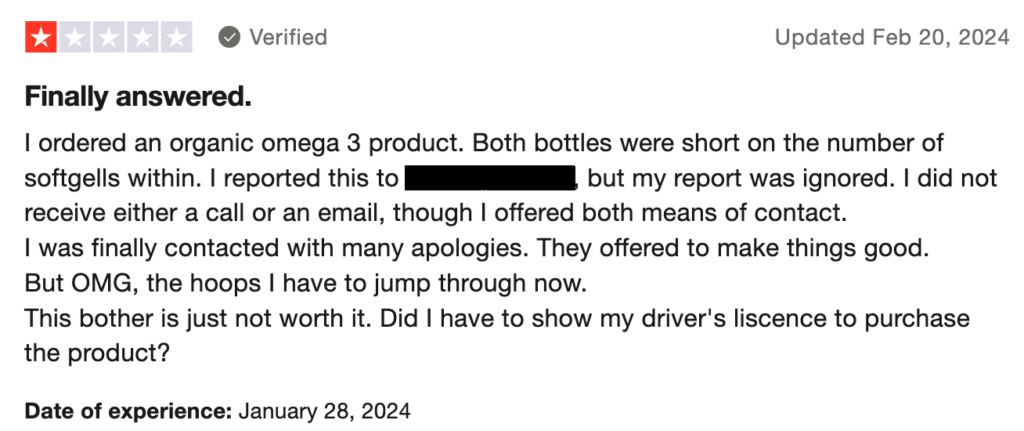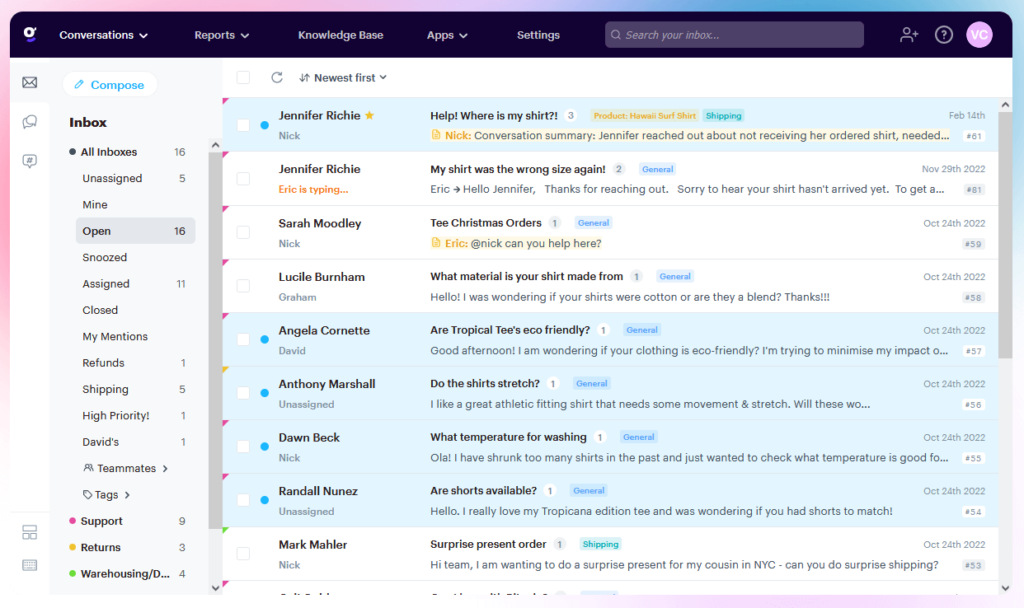Customer-facing roles are vital. They shape the only interactions most people have with your company. So it’s essential to hire team members with the empathy and communication skills to turn a negative experience into a positive one.
At the same time, you may not have the resources to hire a robust customer service team. So how can you determine what type of customer service roles you really need for your business? And what skills are required to excel within those roles?
Rather than list job titles, let’s explore the qualities to look for so you can select and build a more effective support system. Not every customer service agent needs to possess all of these qualities – they just need to be represented somewhere on your team.
1. The Problem Solver
Above all else, your customer service agents need to be able to handle difficult situations. Accuracy and quality of information are important in that process, as is efficiency.
While automation can help with basic inquiries and frequently asked questions, it’s unlikely to resolve more complicated problems. In that situation, you’ll need your team to provide a concrete resolution, along with reassurance that the issue won’t happen again.

In the case of the above review, simply sending the customer a replacement product will no longer be enough. To salvage the situation, the support team needs to reply in a way that validates the customer experience and also provides a concrete solution.
This might involve an incentive to order again via a discount or free replacement product. Whatever the resolution might be, it will require a thoughtful and personalized response.
Problem Solvers Improve FCR Through White Glove Service
McKinsey calls white-glove service the “future of customer experience.” This means customer service that is personalized to the individual, and caters to their specific needs. Customers do already expect that, whatever your company’s size might be.
White-glove service is characterized by “attention to detail, speed, convenience, and emotional fulfillment”, along with a “high standard of service”. These ideals are central to the customer-first mindset you’ll want to cultivate in your team, and are also necessary for effective resolutions.
Having a problem solver on your team is also essential to first contact resolution (FCR), one of the most undervalued customer service metrics. FCR is correlated with white-glove service. They both seek to resolve issues with fewer touch points required, thereby increasing retention and fostering loyalty.
A skilled problem solver can dial into the needs of the customer. That could be by adding a personal flourish to support conversations, or using the integration helpdesk software provides to view previous support ticket history.
The vast majority of customer service jobs require problem solving skills. As a hiring manager or team lead, you can assess these abilities during the interview process.
Customer service roles best suited to the problem solver include:
- Frontline customer service agents
- Customer service managers, supervisors, and team leads
- Social media managers
- Technical support specialists
2. The Empath
Customers should be treated like people, not service tickets. The ’empath’ has the ability to put themselves in customer’s shoes and understand their perspective, demonstrating respect and patience. Empathy also incorporates soft skills like attentiveness.
Why does empathy matter to the customer service experience?
In The Thank You Economy, Gary Vaynerchuk surmises one of the central tenets of his book in a few short words: “Every interaction matters. Every relationship has value.”
People have a desire to feel understood and supported. There’s a reason 50% of U.K. and 40% of U.S. customers polled prefer a human for support over a chatbot. Your team should be able to provide an authentic sense of security and reassurance to customers.
Assessing Empathy for a Customer Service Position
Many customer service candidates have a natural tendency toward empathy. It’s part of what initially attracts people to the position.
Still, it’s not a guarantee. Fortunately, there are a number of ways to assess empathy as a soft skill in an interview:
- Pay attention to verbal cues. The empathetic interviewee will use validating language, or align themselves with the perspective of a potential customer. Statements like “I can understand why they felt that way” reaffirm compassion.
- Look for reflective listening. Reflecting back what was just said demonstrates full engagement, as well as the capacity to be attentive to customers.
- Allow for open-ended questions and stories. These provide insight into personal experience, and encourage the interviewee to share more about their feelings. These responses also help you gain a deeper insight into how they communicate.
This skill can also be fostered and developed in your existing team through empathy training.
Customer service roles best suited to the empath include:
- Social media managers
- Frontline service agents
- Customer service managers, supervisors, or team leads
- Complaint escalation specialists
3. The Clear Communicator
Communication is key for all customer service roles that involve direct interaction. It’s especially important for customer service trainers and frontline representatives, who often act as the face of your brand.
There’s plenty of overlap between this skill and the two other roles we’ve outlined so far. However, the clear communicator should also be excellent at concision and precision.
In the guidebook Unreasonable Hospitality: The Remarkable Power of Giving People More Than They Expect, Will Guidara posits that “Intention means every decision, from the most obviously significant to the seemingly mundane, matters.”
The clear communicator moves with intentionality. They respond with a clear resolution already in mind, and an understanding of what the customer actually wants – not what they think the customer wants.
Assessing Communication Skills
Part of identifying the clear communicator simply relies on listening to how they express themselves. However, when making a new hire or considering whether to move an existing team member into a communication-heavy role, be sure to explore how they’ll communicate with dissatisfied customers.
To do that, you can ask sample questions during the interview process. Run them through example scenarios, real or constructed, involving customer requests/complaints that are unclear or complex. Have them walk through exactly how they’d respond, or even write up sample messages.
Then review the results from the customer’s perspective. Have they understood and addressed the customer’s core issue, in a way that’s straightforward, clear, and hard to misinterpret or take poorly?
Relevant customer service roles for the clear communicator include:
- Frontline customer service agents
- Customer service managers, supervisors, and team leads
- Complaint escalation specialists
4. The Lifelong Learner
Technology is ever-evolving, and your business must be quick to adapt.
For example, the role of AI integration in customer experience is now inescapable. The writing was on the wall years ago, and its prominence has only grown.
Fortunately, AI doesn’t have to be a death-knell to human customer service roles. But it can be a tool to deliver better data-driven experiences. We’ve witnessed companies across the globe push personalization to the forefront of their marketing strategies, using AI to analyze and optimize the customer journey.
What does this mean for customer service?
You need self-motivated, ‘lifelong learners’ in the roles that will require adaptation, like those involving automation. During the interview process, you’ll want to look for candidates who:
- Express a desire to learn about new tools, software, and integrations on their own. Experience with specific software relevant to your business is great, but the drive to learn can’t be taught, while other skills can.
- Consider the rate at which new software is released. Your team is likely to expand into new channels and also leverage new tools for growth over time.
- Can effectively troubleshoot based on the needs of your business. Depending on the product or service your business sells, you’ll likely need customer service roles that integrate with your IT or technical departments.
- Can solve technical problems for customers without turning to others for help. This could be by relying upon troubleshooting, testing, walkthroughs, or tutorials.
Consider, for example, a B2B SaaS company that offers aggregate shipping solutions. Can an interviewee answer a relevant question such as: “How would you diagnose a store connection issue with our platform?”
While a focus on lifelong learning is valuable to any team member, it’s most relevant to customer service positions such as:
- Technical support specialists
- Customer experience specialists
5. The Natural Leader
Last but not least, natural leaders are essential customer service roles for any team. They set performance standards, target metrics, and ensure seamless internal operations.
Decisiveness, humility, and accountability are just a few of the hallmarks of a good leader. And these traits don’t appear overnight.
The ‘natural’ leader probably wasn’t born a leader – unless they’re royalty – but has spent a considerable amount of time developing leadership qualities. More than with any other role, a leader should be able to hit the ground running.
A successful leader will understand:
- Which customer service metrics matter, like customer satisfaction
- How to empower their team with resources (employees shouldn’t be powerless to help customers)
- How to successfully hire and onboard other agents with the aforementioned skills
- The importance of delegation for time management
- Why spending time on the front lines matters
- That customer development is key
Cultivating Leadership Skills in Your Service Team
Often, leaders are promoted within rather than hired from the outside. This approach means they’ll already be familiar with the ground-level work your team does, as well as your business’ approach in a general sense. You won’t have to spend a lot of time molding them in a way that aligns with your core values.
The best leadership training tends to be goal-oriented. Focal points to address include:
- What are the overall goals of your business?
- How should team members be directed toward those goals?
- How will the team be equipped to handle challenges?
A learning management system (LMS) is a useful tool for leadership training if your budget allows. It enables you to distribute engaging content to employees remotely through a central online platform.
Naturally, this skillset lends itself to customer service roles like:
- Customer service managers, supervisors, and team leads
- Customer experience specialists
How To Equip Your Customer Service Team for Success
The secret sauce to every meaningful customer service interaction is a dedicated team with a diverse skillset. With the above customer support roles in place, you’ll already outpace many of your competitors.
At the same time, even the best team will be hampered if they don’t have the resources and tools they need to work effectively. Offering plenty of training and support is a great start, but you’ll also need to provide a toolkit that makes it possible to put that training into action.
That’s what Groove does for your customer support team:

Groove is help desk software that allows for easy collaboration and streamlined workflows. It drives growth by delivering a quick, streamlined customer service experience regardless of the channel buyers choose to communicate through.
Plus, Groove’s shared inboxes and organizational features allow your support agents to route communications to the right place and collaborate effectively. With everything in one place, each team member can step in effortlessly when a situation calls for their particular skillset.
Setting Your Small Business Up To Deliver Quality Customer Service
Going above and beyond for your customers requires a wholistic approach. It’s not just about people and it’s not just about tools – both matter immensely.
Identifying and hiring for the right customer service roles is the first step. Equally important is providing them with the resources they need to make the most of their skills and experience. Doing even one of these will take you a long way, but mastering both is key to standing out in a crowded niche.
If you want to set your customer support team up for success, sign up for a Groove free trial today! Equip your support team with software that’s easy to use, affordable, and flexible.




